Unit 6 Outdoor fun Grammar课件(共41张PPT)
文档属性
| 名称 | Unit 6 Outdoor fun Grammar课件(共41张PPT) | 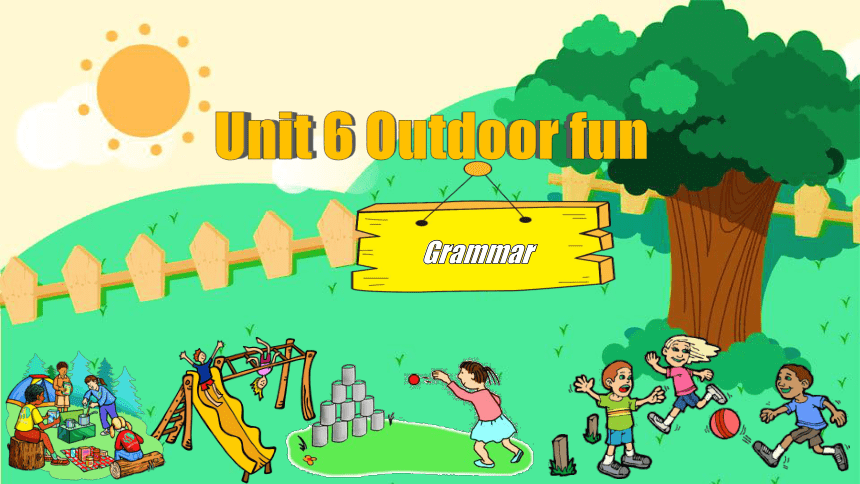 | |
| 格式 | pptx | ||
| 文件大小 | 12.5MB | ||
| 资源类型 | 教案 | ||
| 版本资源 | 牛津译林版 | ||
| 科目 | 英语 | ||
| 更新时间 | 2023-04-20 15:27:20 | ||
图片预览

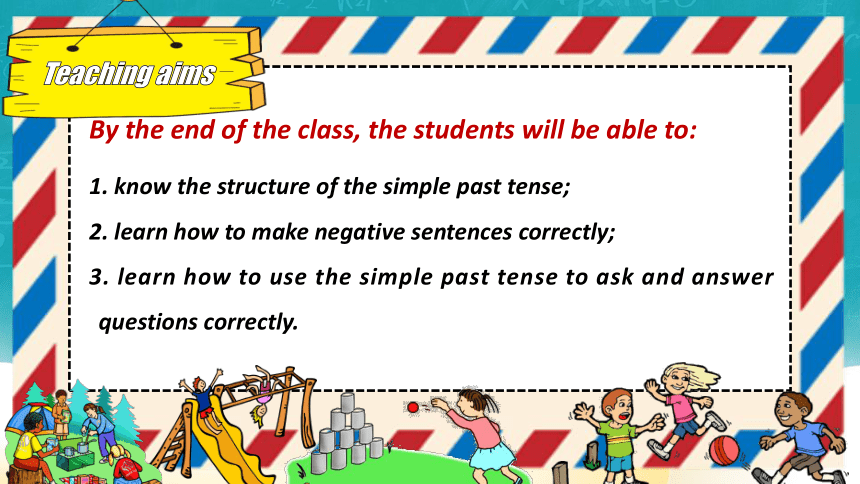
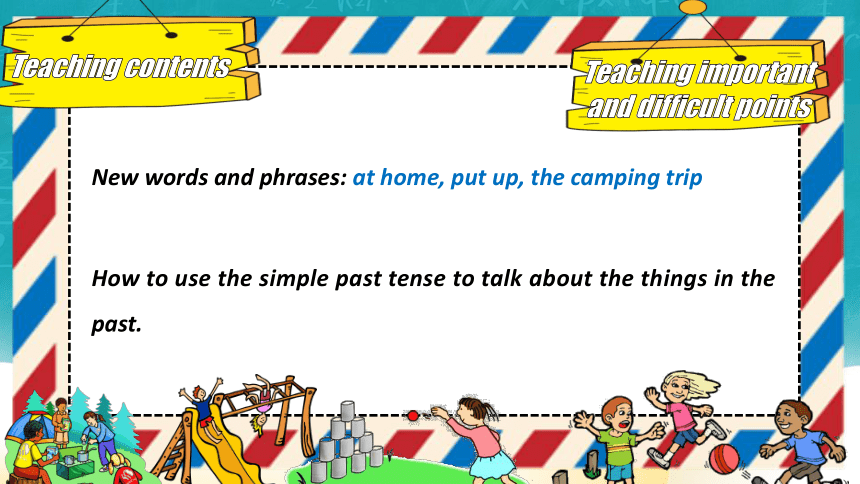





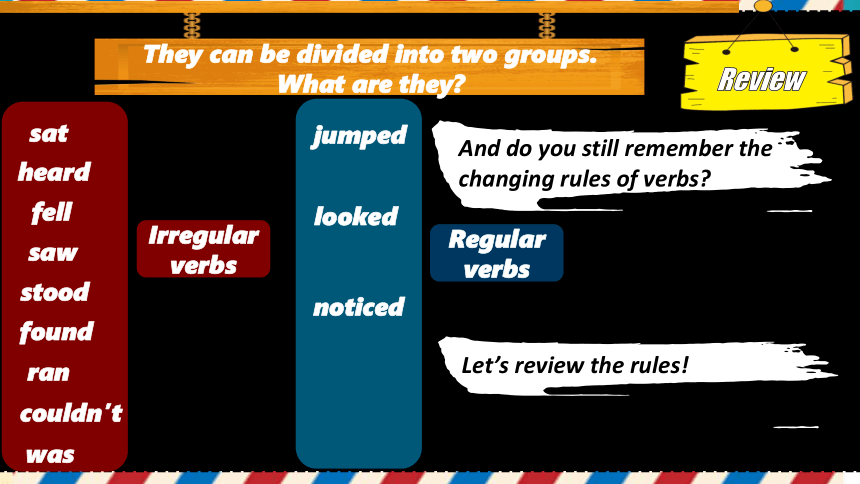
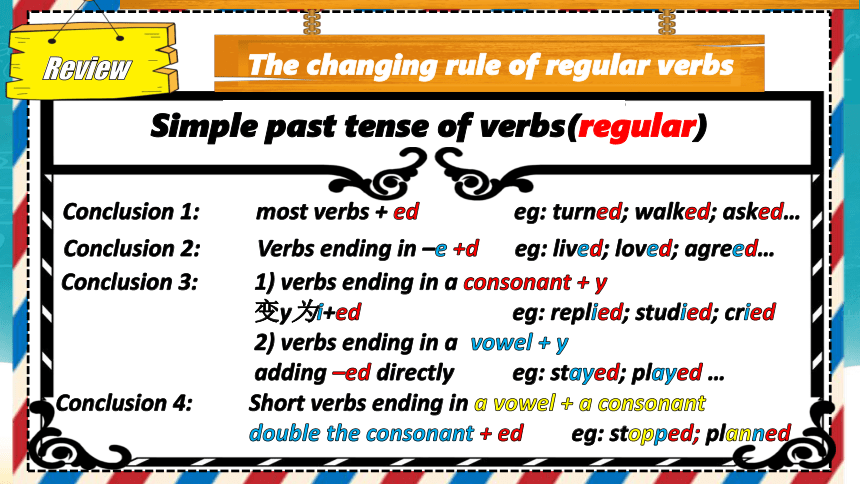
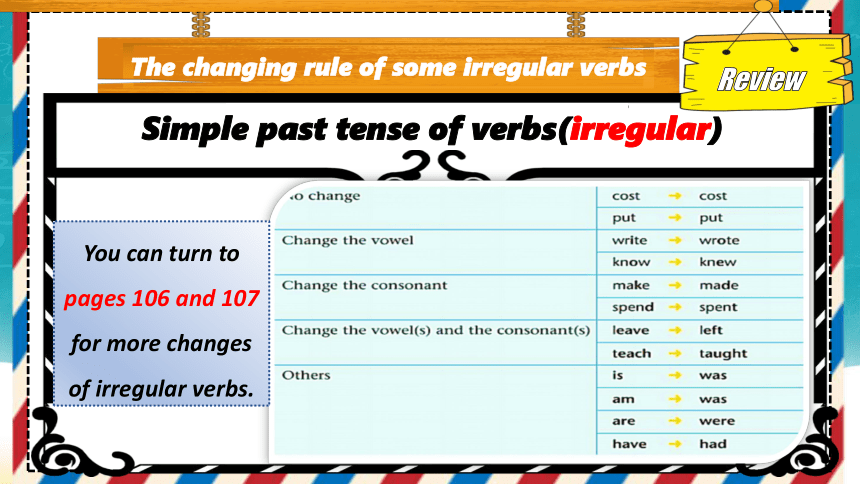

文档简介
(共41张PPT)
Unit 6 Outdoor fun
Grammar
Teaching aims
By the end of the class, the students will be able to:
1. know the structure of the simple past tense;
2. learn how to make negative sentences correctly;
3. learn how to use the simple past tense to ask and answer questions correctly.
Teaching contents
New words and phrases: at home, put up, the camping trip
How to use the simple past tense to talk about the things in the past.
Teaching important
and difficult points
Part one
Lead in
Lead in
Do you still remember the main characters in the story last class
Let’s review the story.
Alice and a rabbit in
a coat
On a sunny day, Alice _____ by the river with her sister, then she _______ a sound. She _______ up and _____ a rabbit in a coat passing by. She _______ up and _____ after the rabbit. Then she ________ down a hole after the rabbit. Then, she ______ for a long time. At last, she _______ herself in a long, low hall. She _________ a small door and she could see a lovely garden on the other side. But she _________ go through the door, because she _______ too heavy.
Mr. Rabbit wrote a diary, but some words are missing. Please help him finish it
Lead in
sat
heard
looked
saw
stood
ran
jumped
fell
found
noticed
couldn’t
was
Part two
Review
sat
heard
looked
saw
stood
ran
jumped
fell
found
noticed
couldn’t
was
They can be divided into two groups.
What are they
Look at some verbs and the past forms on the screen.
Review
They can be divided into two groups.
What are they
Review
sat
heard
saw
stood
ran
fell
found
couldn’t
was
looked
jumped
noticed
Irregular verbs
Regular verbs
And do you still remember the changing rules of verbs
Let’s review the rules!
Simple past tense of verbs(regular)
Conclusion 1: most verbs + ed eg: turned; walked; asked…
Conclusion 2: Verbs ending in –e +d eg: lived; loved; agreed…
Conclusion 3: 1) verbs ending in a consonant + y
变y为i+ed eg: replied; studied; cried
2) verbs ending in a vowel + y
adding –ed directly eg: stayed; played …
Conclusion 4: Short verbs ending in a vowel + a consonant
double the consonant + ed eg: stopped; planned
The changing rule of regular verbs
Review
The changing rule of some irregular verbs
Simple past tense of verbs(irregular)
You can turn to pages 106 and 107 for more changes of irregular verbs.
Review
Why should we use the simple past tense
Andy picked up the little cat the other day.
Look at the two sentences.
They turned around but saw nothing that day.
Because of “that day” and “the other day” are the time markers of the simple past tense.
Review
Let’s review the time markers of the simple past tense.
Time markers
1. 时间段+ago eg: 2 days ago
2. last+时间 eg: last night/week
3. just now
4. yesterday; yesterday morning/afternoon/evening; the
day before yesterday
5. this morning 6. the other day
Review
Part three
Presentation
Presentation
Fill in the blanks using the simple past tense.
Alice ____ (be) outside one sunny day.
was
She was not at home one sunny day.
We use “was not” or “wasn’t” to form the negative sentence.
wasn’t
Presentation
Fill in the blanks using the simple past tense.
They ____(be) in the wonderland.
were
They were not on the playground.
weren’t
We use “were not” or “weren’t” to form the negative sentence.
Presentation
We know that Alice jumped into the hole after the rabbit.
She did not want the rabbit to get away.
didn’t
So we can also use “did not do” or “didn’t do” to form negative sentences.
She ______ (want)to follow the rabbit.
wanted
Fill in the blanks using the simple past tense.
Presentation
Alice _____ (can) see the lovely garden on the other side.
could
She could not go through the door because she was too big.
couldn’t
We use “could not do” or “couldn’t do” to form negative sentences.
Presentation
We use “was not” or “wasn’t” to form the negative sentence.
We use “were not” or “weren’t” to form the negative sentence.
So we can also use “did not do” or “didn’t do” to form negative sentences.
We use “could not do” or “couldn’t do” to form negative sentences.
If we want to make negative sentences with simple past tense, we can use wasn’t, weren’t and didn’t.
It’s time to work out the rules.
Presentation
They/We/You were not on the playground.
Let’s explain more clearly.
She/He/I/It was not at home one sunny day.
She could not go through the door because she was too big.
有be就用be, 有情就用情。否定be情加not. was not=wasn’t; were not = weren’t.
Presentation
Let’s explain more clearly.
She did not want the rabbit to get away.
She wanted to follow the rabbit.
实义行为动词
实义行为动词
无be无情(实义行为v.)用did,否定did加not. 用did动还原
did not= didn’t
Conclusion 1
一般过去时句子肯定变否定
有be就用be, 有情就用情。否定be情加not. was not=wasn’t; were not = weren’t.
I was here yesterday.
I _______ _______ here yesterday.
2. They were angry that day.
They ________ _______ that day.
was
not
weren’t
angry
I went to the park just now.
I ______ _______ _______ to the park.
2. Alice fell down the rabbit hole.
Alice ______ ____ down the rabbit hole.
did
not
go
didn’t
fall
无be无情(实义行为v.)用did,否定did加not. 用did动还原
did not= didn’t
Change the sentences into the negative ones.
One sunny day, Alice sat by a river with her sister.
One sunny day, Alice ______ ______ by a river with her sister.
2. It took watch out of its pocket.
It ______ ______ _______ watch out of its pocket.
3. There were doors all around.
There _______ _______ doors all around.
4. Alice put the key into it.
Alice _______ ______ the key into it.
5. She could see a lovely garden on the other side.
She ________ _________ see a lovely garden on the other side.
6. She was too big.
She ________ too big.
Exercise 1
didn’t sit
did
not
take
were
not
didn’t put
could
not
wasn’t
Exercise 2
visited
had
play
practised
went
go
stayed
read
Presentation
Did Millie visit the park and have a good time
Yes, she did.
No, he didn’t.
He practiced playing volleyball with his friends.
Yes, she did.
Did Daniel go out yesterday
Did Simon play football
Did kitty go shopping
What did he do then
No, he didn’t.
What did he do yesterday
He stayed at home and read some books.
Ask and answer
Presentation
Let’s pay attention to the sentences.
Did Millie visit the park and have a good time
Did Simon play football
Did kitty go shopping
Did Daniel go out yesterday
过去时态
一般疑问句句型:
Did +主语+v.原+其他?
(did提前,动词还原)
回答句:Yes/No, sb. did/didn’t
What did he do then
What did he do yesterday
过去时态
特殊疑问句句型:
特疑词+did +主语+v.原+其他?
Yes, she did.
No, he didn’t.
Yes, she did.
No, he didn’t.
Presentation
Let’s pay attention to the sentences.
Were there doors all around
Yes, there were (doors all around)
Were they all locked
Yes, they were (all locked)
Was Alice too big to go through the door
Yes, she was (too big to…)
过去时态
一般疑问句句型:
Was/Were +主语+其他?
(有be就用be,一般疑问Be提前)
回答句:Yes/No, sb. be not
Could she see a lovely garden on the other side
Yes, she could (see…)
过去时态
一般疑问句句型:
Could(情动)+主语+v.原其他?
(有情就用情,一般疑问情提前)
回答句:Yes/No, sb. 情+not
Conclusion 2
一般过去时句子变疑问
1. Was/Were +主语+其他?
回答句:Yes/No, sb. be not
2. Could(情动)+主语+v.原+其他?
回答句:Yes/No, sb. 情+not
过去时态
一般疑问句变化口诀②:
无be无情用did;
一般疑问did提前;
用did动还原。
3. Did +主语+v.原+其他?
回答句:Yes/No, sb. did/didn’t
4.特殊疑问句:
特疑词+did +主语+v.原+其他?
过去时态
一般疑问句变化口诀①:
有be就用be;
有情就用情;
一般疑问be/情提前。
Exercise 3
Did
go
didn’t
went
Was
was
did
do
put
were
rowed
stay
Did
did
was
Exercise 4
Change the sentences as directed.
They were all surprised to see this picture. (变为一般疑问句)
______ ______ all surprised to see this picture.
2. I was afraid of the dark when I was young. (变为一般疑问句)
______ ______ afraid of the dark when I was young
3. She told Andy everything. (变为一般疑问句)
______ she ______ Andy everything
4. They took the little cat to the animal centre (变为一般疑问句)
______ they ______ little cat to the animal centre
5. The children put up a tent in the park yesterday (变为一般疑问句)
______ the children ______ up a tent in the park yesterday
6. Jack had some apples and pears. (变为一般疑问句)
______ Jack ______ ______ apples ______ pears
Were
they
Were
you
Did
tell
Did
take
Did
put
Did
have
any
or
人称1变2
some; and 在一般疑问句中变any; or
Part four
Production
we can find many weekend activities on Page 74 . What are they
Production
go camping
visit the park
practise football
play volleyball
go shopping
read books
at home
What activities did you do last weekend
Talk with your partners and make up a dialogue.
Production
A: Did you go … last weekend
B: No, I didn’t. I … last weekend.
A: Was it interesting
B: Yes, it is.
A: What did you do there
B: We… We were happy there. How about you
A: I … last weekend.
B: Did you have fun there
A: Yes, I did.
B: What did you do there
A: I… It was really wonderful.
You can use these sentence patterns for help.
Part five
Homework
1. Review the usage of the simple past tense.
2. Write about your last weekend.
1. Review the usage of the simple past tense.
2. Write about your last weekend.
1. Review the usage of the simple past tense.
2. Write about your last weekend.
Homework
1. Review the usage of the simple past tense.
2. Write about your last weekend.
Part five
Summary &
language points
Summary---words
surprise vt.使惊奇
put up 搭,竖立
tent n.帐篷
put up our tent near a lake
在湖边支起我们的帐篷
stay outside all night
一整晚都待在外面
Summary---phrases
Summary---sentences
She heard a sound. 她听到一个声音。
She didn't hear a sound. 她没有听到声音。
He was/wasn’t at home yesterday. 他昨天在/不在家。
We were/weren’t at home yesterday.我们昨天在/不在家。
Did she hear a sound 她听到声音了吗?Yes, she did. No, she didn't.
Was he at home yesterday. 他昨天在家吗? Yes, he was. No, he wasn't.
Were you at home yesterday Yes, we were. No, we weren't.
We put up our tent near a lake.
我们在湖的附近搭建了我们的帐篷。(P74)
put up
此处意为“搭,竖起”。另外, put up还可意为“挂起;张贴;举起;抬起”。
与 put 相关的短语:
put on穿上 put off推迟 put away收拾 put out扑灭
put down放下 put...in order把...整理得井井有条 put back 放回
Language points
2. He practised playing volleyball with his friend.
他和他的朋友练习打排球。(P74)
practise 动词,意为“练习”,后接名词,代词,v. -ing 形式作宾语。
practise doing sth. 意为“练习做某事”。
→We should practise spoken English every day.我们应该每天都练习英语口语。
注意: practise为动词,多用于英式英语中,在英式英语中表示“练习”的名词应用practice,而在美式英语中practice既可用作动词也可用作名词
Language points
Language points
3. Did you stay outside all night?
你们整晚都待在外面吗?(P74)
all night 意为“通宵,整夜”。注意 night 之前没有定冠词。
拓展:all day and all night 表示“整日整夜”。
Unit 6 Outdoor fun
Grammar
Teaching aims
By the end of the class, the students will be able to:
1. know the structure of the simple past tense;
2. learn how to make negative sentences correctly;
3. learn how to use the simple past tense to ask and answer questions correctly.
Teaching contents
New words and phrases: at home, put up, the camping trip
How to use the simple past tense to talk about the things in the past.
Teaching important
and difficult points
Part one
Lead in
Lead in
Do you still remember the main characters in the story last class
Let’s review the story.
Alice and a rabbit in
a coat
On a sunny day, Alice _____ by the river with her sister, then she _______ a sound. She _______ up and _____ a rabbit in a coat passing by. She _______ up and _____ after the rabbit. Then she ________ down a hole after the rabbit. Then, she ______ for a long time. At last, she _______ herself in a long, low hall. She _________ a small door and she could see a lovely garden on the other side. But she _________ go through the door, because she _______ too heavy.
Mr. Rabbit wrote a diary, but some words are missing. Please help him finish it
Lead in
sat
heard
looked
saw
stood
ran
jumped
fell
found
noticed
couldn’t
was
Part two
Review
sat
heard
looked
saw
stood
ran
jumped
fell
found
noticed
couldn’t
was
They can be divided into two groups.
What are they
Look at some verbs and the past forms on the screen.
Review
They can be divided into two groups.
What are they
Review
sat
heard
saw
stood
ran
fell
found
couldn’t
was
looked
jumped
noticed
Irregular verbs
Regular verbs
And do you still remember the changing rules of verbs
Let’s review the rules!
Simple past tense of verbs(regular)
Conclusion 1: most verbs + ed eg: turned; walked; asked…
Conclusion 2: Verbs ending in –e +d eg: lived; loved; agreed…
Conclusion 3: 1) verbs ending in a consonant + y
变y为i+ed eg: replied; studied; cried
2) verbs ending in a vowel + y
adding –ed directly eg: stayed; played …
Conclusion 4: Short verbs ending in a vowel + a consonant
double the consonant + ed eg: stopped; planned
The changing rule of regular verbs
Review
The changing rule of some irregular verbs
Simple past tense of verbs(irregular)
You can turn to pages 106 and 107 for more changes of irregular verbs.
Review
Why should we use the simple past tense
Andy picked up the little cat the other day.
Look at the two sentences.
They turned around but saw nothing that day.
Because of “that day” and “the other day” are the time markers of the simple past tense.
Review
Let’s review the time markers of the simple past tense.
Time markers
1. 时间段+ago eg: 2 days ago
2. last+时间 eg: last night/week
3. just now
4. yesterday; yesterday morning/afternoon/evening; the
day before yesterday
5. this morning 6. the other day
Review
Part three
Presentation
Presentation
Fill in the blanks using the simple past tense.
Alice ____ (be) outside one sunny day.
was
She was not at home one sunny day.
We use “was not” or “wasn’t” to form the negative sentence.
wasn’t
Presentation
Fill in the blanks using the simple past tense.
They ____(be) in the wonderland.
were
They were not on the playground.
weren’t
We use “were not” or “weren’t” to form the negative sentence.
Presentation
We know that Alice jumped into the hole after the rabbit.
She did not want the rabbit to get away.
didn’t
So we can also use “did not do” or “didn’t do” to form negative sentences.
She ______ (want)to follow the rabbit.
wanted
Fill in the blanks using the simple past tense.
Presentation
Alice _____ (can) see the lovely garden on the other side.
could
She could not go through the door because she was too big.
couldn’t
We use “could not do” or “couldn’t do” to form negative sentences.
Presentation
We use “was not” or “wasn’t” to form the negative sentence.
We use “were not” or “weren’t” to form the negative sentence.
So we can also use “did not do” or “didn’t do” to form negative sentences.
We use “could not do” or “couldn’t do” to form negative sentences.
If we want to make negative sentences with simple past tense, we can use wasn’t, weren’t and didn’t.
It’s time to work out the rules.
Presentation
They/We/You were not on the playground.
Let’s explain more clearly.
She/He/I/It was not at home one sunny day.
She could not go through the door because she was too big.
有be就用be, 有情就用情。否定be情加not. was not=wasn’t; were not = weren’t.
Presentation
Let’s explain more clearly.
She did not want the rabbit to get away.
She wanted to follow the rabbit.
实义行为动词
实义行为动词
无be无情(实义行为v.)用did,否定did加not. 用did动还原
did not= didn’t
Conclusion 1
一般过去时句子肯定变否定
有be就用be, 有情就用情。否定be情加not. was not=wasn’t; were not = weren’t.
I was here yesterday.
I _______ _______ here yesterday.
2. They were angry that day.
They ________ _______ that day.
was
not
weren’t
angry
I went to the park just now.
I ______ _______ _______ to the park.
2. Alice fell down the rabbit hole.
Alice ______ ____ down the rabbit hole.
did
not
go
didn’t
fall
无be无情(实义行为v.)用did,否定did加not. 用did动还原
did not= didn’t
Change the sentences into the negative ones.
One sunny day, Alice sat by a river with her sister.
One sunny day, Alice ______ ______ by a river with her sister.
2. It took watch out of its pocket.
It ______ ______ _______ watch out of its pocket.
3. There were doors all around.
There _______ _______ doors all around.
4. Alice put the key into it.
Alice _______ ______ the key into it.
5. She could see a lovely garden on the other side.
She ________ _________ see a lovely garden on the other side.
6. She was too big.
She ________ too big.
Exercise 1
didn’t sit
did
not
take
were
not
didn’t put
could
not
wasn’t
Exercise 2
visited
had
play
practised
went
go
stayed
read
Presentation
Did Millie visit the park and have a good time
Yes, she did.
No, he didn’t.
He practiced playing volleyball with his friends.
Yes, she did.
Did Daniel go out yesterday
Did Simon play football
Did kitty go shopping
What did he do then
No, he didn’t.
What did he do yesterday
He stayed at home and read some books.
Ask and answer
Presentation
Let’s pay attention to the sentences.
Did Millie visit the park and have a good time
Did Simon play football
Did kitty go shopping
Did Daniel go out yesterday
过去时态
一般疑问句句型:
Did +主语+v.原+其他?
(did提前,动词还原)
回答句:Yes/No, sb. did/didn’t
What did he do then
What did he do yesterday
过去时态
特殊疑问句句型:
特疑词+did +主语+v.原+其他?
Yes, she did.
No, he didn’t.
Yes, she did.
No, he didn’t.
Presentation
Let’s pay attention to the sentences.
Were there doors all around
Yes, there were (doors all around)
Were they all locked
Yes, they were (all locked)
Was Alice too big to go through the door
Yes, she was (too big to…)
过去时态
一般疑问句句型:
Was/Were +主语+其他?
(有be就用be,一般疑问Be提前)
回答句:Yes/No, sb. be not
Could she see a lovely garden on the other side
Yes, she could (see…)
过去时态
一般疑问句句型:
Could(情动)+主语+v.原其他?
(有情就用情,一般疑问情提前)
回答句:Yes/No, sb. 情+not
Conclusion 2
一般过去时句子变疑问
1. Was/Were +主语+其他?
回答句:Yes/No, sb. be not
2. Could(情动)+主语+v.原+其他?
回答句:Yes/No, sb. 情+not
过去时态
一般疑问句变化口诀②:
无be无情用did;
一般疑问did提前;
用did动还原。
3. Did +主语+v.原+其他?
回答句:Yes/No, sb. did/didn’t
4.特殊疑问句:
特疑词+did +主语+v.原+其他?
过去时态
一般疑问句变化口诀①:
有be就用be;
有情就用情;
一般疑问be/情提前。
Exercise 3
Did
go
didn’t
went
Was
was
did
do
put
were
rowed
stay
Did
did
was
Exercise 4
Change the sentences as directed.
They were all surprised to see this picture. (变为一般疑问句)
______ ______ all surprised to see this picture.
2. I was afraid of the dark when I was young. (变为一般疑问句)
______ ______ afraid of the dark when I was young
3. She told Andy everything. (变为一般疑问句)
______ she ______ Andy everything
4. They took the little cat to the animal centre (变为一般疑问句)
______ they ______ little cat to the animal centre
5. The children put up a tent in the park yesterday (变为一般疑问句)
______ the children ______ up a tent in the park yesterday
6. Jack had some apples and pears. (变为一般疑问句)
______ Jack ______ ______ apples ______ pears
Were
they
Were
you
Did
tell
Did
take
Did
put
Did
have
any
or
人称1变2
some; and 在一般疑问句中变any; or
Part four
Production
we can find many weekend activities on Page 74 . What are they
Production
go camping
visit the park
practise football
play volleyball
go shopping
read books
at home
What activities did you do last weekend
Talk with your partners and make up a dialogue.
Production
A: Did you go … last weekend
B: No, I didn’t. I … last weekend.
A: Was it interesting
B: Yes, it is.
A: What did you do there
B: We… We were happy there. How about you
A: I … last weekend.
B: Did you have fun there
A: Yes, I did.
B: What did you do there
A: I… It was really wonderful.
You can use these sentence patterns for help.
Part five
Homework
1. Review the usage of the simple past tense.
2. Write about your last weekend.
1. Review the usage of the simple past tense.
2. Write about your last weekend.
1. Review the usage of the simple past tense.
2. Write about your last weekend.
Homework
1. Review the usage of the simple past tense.
2. Write about your last weekend.
Part five
Summary &
language points
Summary---words
surprise vt.使惊奇
put up 搭,竖立
tent n.帐篷
put up our tent near a lake
在湖边支起我们的帐篷
stay outside all night
一整晚都待在外面
Summary---phrases
Summary---sentences
She heard a sound. 她听到一个声音。
She didn't hear a sound. 她没有听到声音。
He was/wasn’t at home yesterday. 他昨天在/不在家。
We were/weren’t at home yesterday.我们昨天在/不在家。
Did she hear a sound 她听到声音了吗?Yes, she did. No, she didn't.
Was he at home yesterday. 他昨天在家吗? Yes, he was. No, he wasn't.
Were you at home yesterday Yes, we were. No, we weren't.
We put up our tent near a lake.
我们在湖的附近搭建了我们的帐篷。(P74)
put up
此处意为“搭,竖起”。另外, put up还可意为“挂起;张贴;举起;抬起”。
与 put 相关的短语:
put on穿上 put off推迟 put away收拾 put out扑灭
put down放下 put...in order把...整理得井井有条 put back 放回
Language points
2. He practised playing volleyball with his friend.
他和他的朋友练习打排球。(P74)
practise 动词,意为“练习”,后接名词,代词,v. -ing 形式作宾语。
practise doing sth. 意为“练习做某事”。
→We should practise spoken English every day.我们应该每天都练习英语口语。
注意: practise为动词,多用于英式英语中,在英式英语中表示“练习”的名词应用practice,而在美式英语中practice既可用作动词也可用作名词
Language points
Language points
3. Did you stay outside all night?
你们整晚都待在外面吗?(P74)
all night 意为“通宵,整夜”。注意 night 之前没有定冠词。
拓展:all day and all night 表示“整日整夜”。
